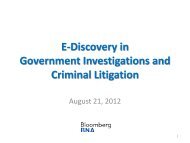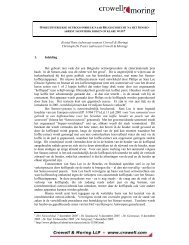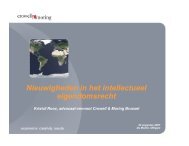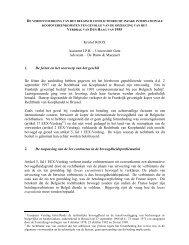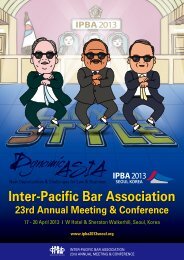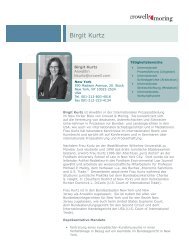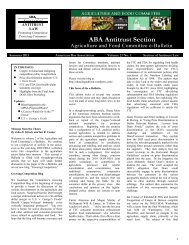CorPorAtE IntEgrIty AgrEEmEnts (CIAs) - Crowell & Moring
CorPorAtE IntEgrIty AgrEEmEnts (CIAs) - Crowell & Moring
CorPorAtE IntEgrIty AgrEEmEnts (CIAs) - Crowell & Moring
You also want an ePaper? Increase the reach of your titles
YUMPU automatically turns print PDFs into web optimized ePapers that Google loves.
• Understand the difference between a Consent Decree,<br />
non-Prosecution Agreement, Deferred Prosecution<br />
Agreement and Corporate Integrity Agreement<br />
• Learn how the U.S. Attorneys, Attorneys General<br />
and the OIG work together when investigating and<br />
prosecuting a case<br />
• Discuss similar and differing requirements companies<br />
face under a DPA and CIA<br />
* how do they come together?<br />
• Use case examples to illustrate current integrity obligations<br />
Moderator:<br />
Lynn Shapiro Snyder, Senior Member,<br />
Epstein Becker and Green P.C.<br />
Panelists:<br />
Kevin O’Dowd, Assistant U.S. Attorney,<br />
U.S. Attorney’s Office of New Jersey<br />
Ryan Tyrrell Lipinski, Assistant Attorney General,<br />
Attorney General’s Office of Illinois<br />
4:30 Understand the Role and Relationship of an<br />
Independent Review Organization (IRO)<br />
<strong>CIAs</strong> frequently require an organization settling False Claims<br />
Act and overpayment allegations with the government to<br />
engage an IRO to review compliance with the CIA and<br />
the terms of the settlement agreement. The IRO reviews<br />
the organization’s compliance with federal and state laws<br />
and regulations, the company’s arrangements database,<br />
documentation, claims, processes, systems and unallowable<br />
costs. At the conclusion of each reporting period under<br />
the CIA, the IRO writes a report which is delivered to the<br />
organization and included in the annual report to the OIG.<br />
In this session, attendees learn about HHS-OIG Guidance<br />
concerning the IRO process and examine the relationship<br />
between IROs and manufacturers, distributors or other<br />
healthcare providers. Among other areas, the session<br />
examines:<br />
• What does it mean that the IRO is “Independent”<br />
during the review stage?<br />
• How best to cooperate with the IRO<br />
• Communication between the IRO and the organization<br />
• How to keep IRO costs down<br />
• What happens after the first reporting period?<br />
• The nature of unallowable costs<br />
• The narrow scope of review<br />
• Hear feedback from organizations under IROs<br />
Virginia B. Evans, Managing Director,<br />
Daylight Forensic & Advisory LLC<br />
5:15 Turn a CIA Lemon into Operational Lemonade<br />
— Preparing for Success Before You Are Hit<br />
Negotiating and implementing a CIA with the OIG is<br />
a daunting and ominous event, often fraught with fear,<br />
uncertainty and negativity. But, there are specific steps<br />
organizations can take both in preparation and during<br />
implementation to turn this “lemon into lemonade.” In this<br />
session, discuss key factors to transform a CIA from bad news<br />
into good news with associated positive results and outcomes.<br />
• Develop effective working relationships with the OIG<br />
and an IRO that achieve consistent clarity, agreement<br />
and alignment<br />
• Use metrics, benchmarking and trend analysis to<br />
demonstrate measurable progress, meeting CIA<br />
requirements and compliance program effectiveness<br />
• Align your organization from the Board and C-suite<br />
to managers and employees on how to implement<br />
the CIA and identify opportunities for constructive<br />
outcomes that add business value<br />
• Position your organization for successful<br />
implementation and possible early termination<br />
of a CIA<br />
L. Stephan Vincze, J.D., LL.M., MBA,<br />
National Managing Director, Life Sciences/Forensic & Dispute Services,<br />
Deloitte Financial Advisory Services, LLP;<br />
Former Chief Ethics & Compliance Officer/Privacy Officer,<br />
TAP Pharmaceuticals<br />
6:00 Close of Day One<br />
photo by: Photolink / Getty Images<br />
6:00-7:00 Networking,<br />
Wine & Cheese Reception<br />
Day Two — Thursday, June 18, 2009<br />
7:30 Continental Breakfast<br />
Join colleagues and friends in a relaxed setting.<br />
8:00 Co-Chair’s Welcome and Review of Day One<br />
Thomas Gregory, Partner, Fraud Investigation & Dispute Services,<br />
Ernst & Young<br />
Eileen Erdos, Principal, Fraud Investigation & Dispute Services,<br />
Ernst & Young<br />
use Industry CIA Experiences to<br />
Enhance Compliance Practices<br />
8:15 Develop and Maintain an Arrangements<br />
Database — Analyze Your Company’s Readiness<br />
Many recent <strong>CIAs</strong> require life science companies to create and<br />
maintain an arrangements database and develop procedures<br />
that help ensure the arrangements do not violate company<br />
processes or legal requirements. This can be a large scale<br />
initiative that may cut across a number of corporate functions<br />
including Ethics & Compliance, Legal and Information<br />
Technology as well as other various business units.<br />
• Identify and address key requirements and<br />
considerations before beginning the process of data<br />
and document collection<br />
• Create optimal business processes and streamline<br />
technical architecture for database creation



